each、every-any-either的区别、用法、详细解答、练习及练习详解(敢说网上最详细、最
常见不定代词的用法
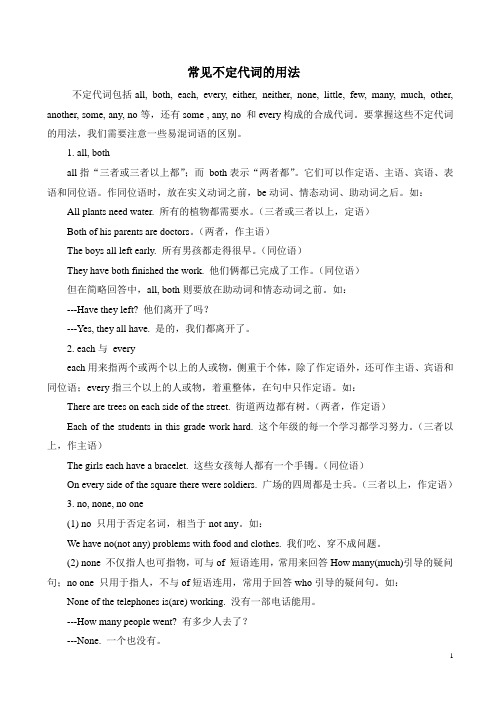
常见不定代词的用法不定代词包括all, both, each, every, either, neither, none, little, few, many, much, other, another, some, any, no等,还有some , any, no 和every构成的合成代词。
要掌握这些不定代词的用法,我们需要注意一些易混词语的区别。
1. all, bothall指“三者或三者以上都”;而both表示“两者都”。
它们可以作定语、主语、宾语、表语和同位语。
作同位语时,放在实义动词之前,be动词、情态动词、助动词之后。
如:All plants need water. 所有的植物都需要水。
(三者或三者以上,定语)Both of his parents are doctors。
(两者,作主语)The boys all left early. 所有男孩都走得很早。
(同位语)They have both finished the work. 他们俩都已完成了工作。
(同位语)但在简略回答中,all, both则要放在助动词和情态动词之前。
如:---Have they left? 他们离开了吗?---Yes, they all have. 是的,我们都离开了。
2. each与everyeach用来指两个或两个以上的人或物,侧重于个体,除了作定语外,还可作主语、宾语和同位语;every指三个以上的人或物,着重整体,在句中只作定语。
如:There are trees on each side of the street. 街道两边都有树。
(两者,作定语)Each of the students in this grade work hard. 这个年级的每一个学习都学习努力。
(三者以上,作主语)The girls each have a bracelet. 这些女孩每人都有一个手镯。
(同位语)On every side of the square there were soldiers. 广场的四周都是士兵。
every和each的区别用法例句
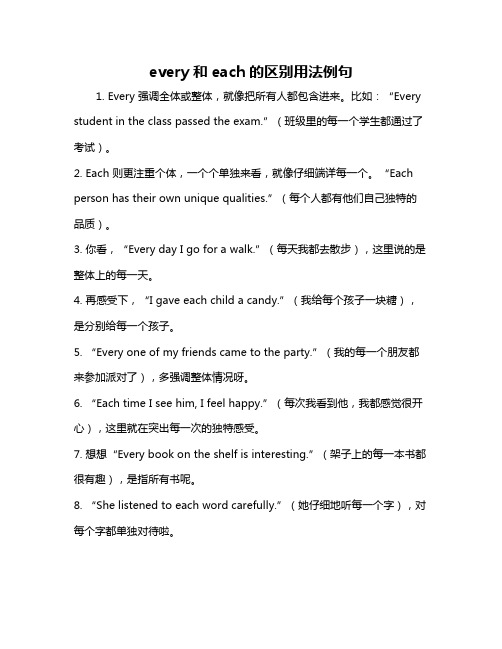
every和each的区别用法例句
1. Every 强调全体或整体,就像把所有人都包含进来。
比如:“Every student in the class passed the exam.”(班级里的每一个学生都通过了考试)。
2. Each 则更注重个体,一个个单独来看,就像仔细端详每一个。
“Each person has their own unique qualities.”(每个人都有他们自己独特的品质)。
3. 你看,“Every day I go for a walk.”(每天我都去散步),这里说的是整体上的每一天。
4. 再感受下,“I gave each child a candy.”(我给每个孩子一块糖),是分别给每一个孩子。
5. “Every one of my friends came to the party.”(我的每一个朋友都来参加派对了),多强调整体情况呀。
6. “Each time I see him, I feel happy.”(每次我看到他,我都感觉很开心),这里就在突出每一次的独特感受。
7. 想想“Every book on the shelf is interesting.”(架子上的每一本书都很有趣),是指所有书呢。
8. “She listened to each word carefully.”(她仔细地听每一个字),对每个字都单独对待啦。
9. “Every choice we make has consequences.”(我们做的每一个选择都有后果)。
总之,every 和 each 在用法上确实有些不同呢,但只要多体会,就一定能掌握好呀!。
第05章 all,each,every,both,neither, either,some,any
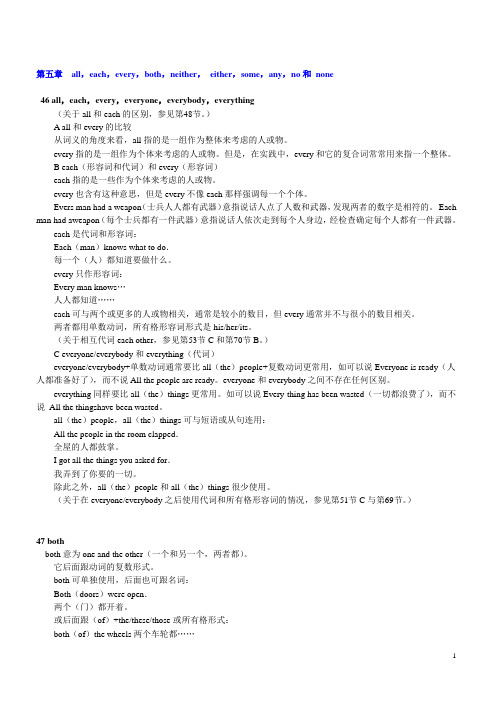
第五章all,each,every,both,neither,either,some,any,no和none46 all,each,every,everyone,everybody,everything(关于all和each的区别,参见第48节。
)A all和every的比较从词义的角度来看,all指的是一组作为整体来考虑的人或物。
every指的是一组作为个体来考虑的人或物。
但是,在实践中,every和它的复合词常常用来指一个整体。
B each(形容词和代词)和every(形容词)each指的是一些作为个体来考虑的人或物。
every也含有这种意思,但是every不像each那样强调每一个个体。
Evers man had a weapon(士兵人人都有武器)意指说话人点了人数和武器,发现两者的数字是相符的。
Each man had aweapon(每个士兵都有一件武器)意指说话人依次走到每个人身边,经检查确定每个人都有一件武器。
each是代词和形容词:Each(man)knows what to do.每一个(人)都知道要做什么。
every只作形容词:Every man knows…人人都知道……each可与两个或更多的人或物相关,通常是较小的数目,但every通常并不与很小的数目相关。
两者都用单数动词,所有格形容词形式是his/her/its。
(关于相互代词each other,参见第53节C和第70节B。
)C everyone/everybody和everything(代词)everyone/everybody+单数动词通常要比all(the)people+复数动词更常用,如可以说Everyone is ready(人人都准备好了),而不说All the people are ready。
everyone和everybody之间不存在任何区别。
everything同样要比all(the)things更常用。
完整word版不定代词用法及练习
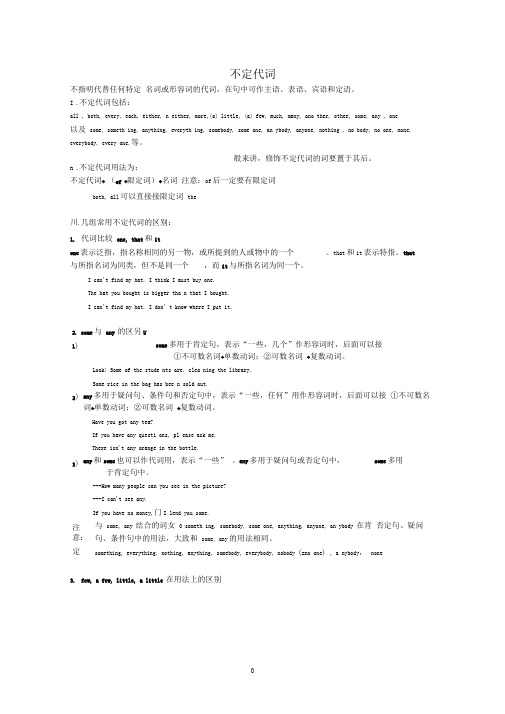
不定代词不指明代替任何特定 名词或形容词的代词,在句中可作主语、表语、宾语和定语。
I .不定代词包括:all , both, every, each, either, n either, more,(a) little, (a) few, much, many, ano ther, other, some, any , one以及 some, someth ing, anything, everyth ing, somebody, some one, an ybody, anyone, nothing , no body, no one, none,everybody, every one.等。
n ,不定代词用法为:不定代词+ (of +限定词)+名词 注意:of 后一定要有限定词both, all 可以直接接限定词 the川.几组常用不定代词的区别:1.代词比较 one, that 和itone 表示泛指,指名称相同的另一物,或所提到的人或物中的一个。
that 和it 表示特指。
that与所指名词为同类,但不是同一个,而it 与所指名词为同一个。
I can't find my hat. I think I must buy one. The hat you bought is bigger tha n that I bought. I can't find my hat. I don' t know where I put it.some 多用于肯定句,表示“一些,几个”作形容词时,后面可以接①不可数名词+单数动词;②可数名词 +复数动词。
Look! Some of the stude nts are. clea ning the library. Some rice in the bag has bee n sold out.any 多用于疑问句、条件句和否定句中,表示“一些,任何”用作形容词时,后面可以接 ①不可数名词+单数动词;②可数名词 +复数动词。
each、every,any,either的区别、用法、详细解答、练习及练习详解(敢说网上最详细、最透彻的)

each和every都有“每个”的意思,但它们在用法上有所不同▲each着重于个别的含义。
every着重于全体的含义,和all的意思相近。
例如:Each student has an English book. 每个学生都有一本英语书。
Every student must study well.每个学生都必须好好学习。
第二个例句中的every student相当于all the students▲each可以用来指两或两个以上的人或东西,但every却总是三个以上的人或东西,不能指两个。
如:可以说each of my eyes, 不可说every one of my eye但可说every one of my toes(脚趾) 。
试译:街道两旁有许多商店。
误:There are many shops on every side of the street.正:There are many shops on each side of the street.误:I gave a present to every one of her parents .正:I gave a present to each of her parents .▲a day=each day(≠every day)①牛津高阶中:every的解释:to refer to groups of three or more which are seen as wholes 与单数可数名词连用, 指至少三个, 视为一整体) 每个; 所有的; 一切的:Every child in the class passed the examination. 班上所有的学生考试都及格了. * I've got every record she has ever made. 我已得到她灌的所有的唱片. * I couldn't hear every word of his speech. 他讲的话并非每句我都能听见. * He examined every item in the set carefully. 他仔细检查了这一套中的各项.②each :every individual member (of a group) 每个: each of the boys, books, buildings 每个男孩﹑每本书﹑每座建筑物* Each of them phoned to thank me. 他们每个人都打电话来向我道谢. * Each of us has a company car. 我们每人都有一辆公司的汽车. I'll see each of you separately. 我要分别地见你们每一个人. He gave us 5 each. 他给我们每人5英镑.③综上,each day 和every day 不是一个意思,换句话说能用each day的地方不能用every day; 能用every day的地方不能用each day.Women generally use up about 2000 calories a day (=each day) .Since I had the accident, I've learned to take each day as it comes.(强调“每一天”,不能换成every day) Let's go out and celebrate. After all, it's not every day you get a new job.Every day is a new day.▲every只能是形容词,用作定语,each既可用作形容词,又可用作代词,在句中可以作定语,主语、宾语、同位语、状语等。
each和every的区别及用法

文章标题:深入剖析each和every的区别及用法1. 前言每个学习英语的人都会遇到each和every这两个词,它们常常被混用,但实际上它们有着细微的区别。
本文将从深度和广度上进行全面评估,以帮助读者更好地理解这两个词的用法。
2. 每个个体的独特性在英语中,each和every都用来表示"每一个"的意思。
然而,它们的用法有所不同。
在具体用法上,each强调的是每一个个体的独特性,而every则强调的是集体或整体。
3. each的用法3.1 each通常用在可数名词前,表示每一个单独的个体或物品。
比如:"Each student has a different opinion."(每个学生都有不同的观点。
)3.2 each也可以单独用在句子中,表示每个人或物都一样地做了某事。
比如:"The students each received a gift."(学生们每个人都收到了礼物。
)4. every的用法4.1 every通常用在单数名词前,表示每一个个体都与其他个体相同。
比如:"Every flower in the garden is blooming."(花园里的每朵花都在开放。
)4.2 every也可以用在句子中,表示每个人或物都都参与了某个动作或状态。
比如:"The children are playing with every toy in the room."(孩子们正在玩房间里的每一件玩具。
)5. 区别总结5.1 从上面的例子可以看出,each强调的是个体的独特性,而every强调的是整体的统一性。
5.2 另外,each常用于强调个体之间的差异,每个都不同;而every常用于描述整体全体,每个都相同。
6. 个人观点从我个人的观点来看,每一个词都有其独特的用法和特点。
在实际运用中,我们需要根据具体情境来选择合适的词语,以表达出我们想要传达的意思。
不定代词each和every的用法区别
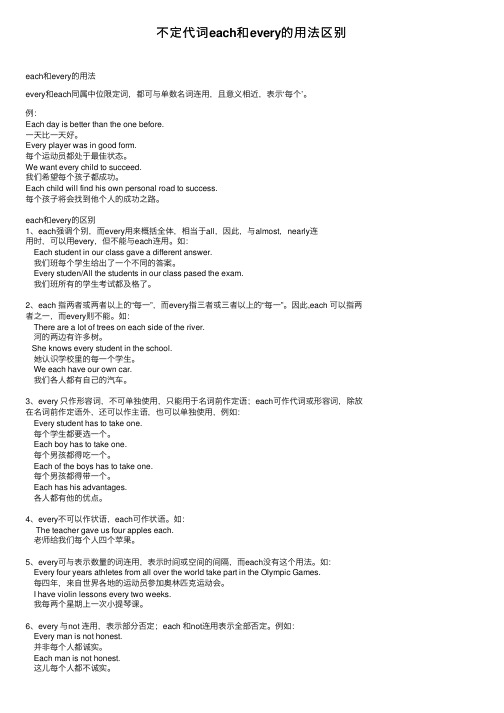
不定代词each和every的⽤法区别each和every的⽤法every和each同属中位限定词,都可与单数名词连⽤,且意义相近,表⽰‘每个’。
例:Each day is better than the one before.⼀天⽐⼀天好。
Every player was in good form.每个运动员都处于最佳状态。
We want every child to succeed.我们希望每个孩⼦都成功。
Each child will find his own personal road to success.每个孩⼦将会找到他个⼈的成功之路。
each和every的区别1、each强调个别,⽽every⽤来概括全体,相当于all,因此,与almost,nearly连⽤时,可以⽤every,但不能与each连⽤。
如:Each student in our class gave a different answer.我们班每个学⽣给出了⼀个不同的答案。
Every studen/All the students in our class pased the exam.我们班所有的学⽣考试都及格了。
2、each 指两者或两者以上的“每⼀”,⽽every指三者或三者以上的“每⼀”。
因此,each 可以指两者之⼀,⽽every则不能。
如:There are a lot of trees on each side of the river.河的两边有许多树。
She knows every student in the school.她认识学校⾥的每⼀个学⽣。
We each have our own car.我们各⼈都有⾃⼰的汽车。
3、every 只作形容词,不可单独使⽤,只能⽤于名词前作定语;each可作代词或形容词,除放在名词前作定语外,还可以作主语,也可以单独使⽤,例如:Every student has to take one.每个学⽣都要选⼀个。
each、every,any,either的区别、用法、详细解答、练习及练习详解(敢说网上最详细、最透彻的)教学文案
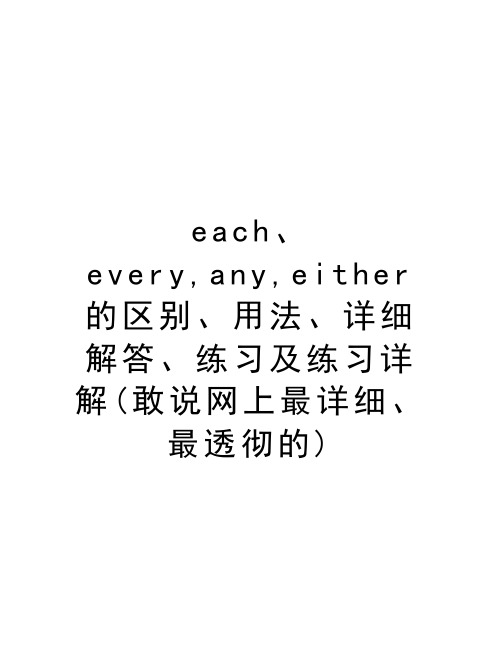
e a c h、e v e r y,a n y,e i t h e r 的区别、用法、详细解答、练习及练习详解(敢说网上最详细、最透彻的)each和every都有“每个”的意思,但它们在用法上有所不同▲each着重于个别的含义。
every着重于全体的含义,和all的意思相近。
例如:Each student has an English book. 每个学生都有一本英语书。
Every student must study well.每个学生都必须好好学习。
第二个例句中的every student相当于all the students▲each可以用来指两或两个以上的人或东西,但every却总是三个以上的人或东西,不能指两个。
如:可以说each of my eyes, 不可说every one of my eye但可说every one of my toes(脚趾) 。
试译:街道两旁有许多商店。
误:There are many shops on every side of the street.正:There are many shops on each side of the street.误:I gave a present to every one of her parents .正:I gave a present to each of her parents .▲a day=each day(≠every day)①牛津高阶中:every的解释:to refer to groups of three or more which are seen as wholes 与单数可数名词连用, 指至少三个, 视为一整体) 每个; 所有的; 一切的: Every child in the class passed the examination. 班上所有的学生考试都及格了. * I've got every record she has ever made. 我已得到她灌的所有的唱片. * I couldn'thear every word of his speech. 他讲的话并非每句我都能听见. * He examined every item in the set carefully. 他仔细检查了这一套中的各项.② each :every individual member (of a group) 每个: each of the boys, books, buildings 每个男孩﹑每本书﹑每座建筑物 * Each of them phoned to thank me. 他们每个人都打电话来向我道谢. * Each of us has a company car. 我们每人都有一辆公司的汽车. I'll see each of you separately. 我要分别地见你们每一个人. He gave us 5 each. 他给我们每人5英镑.③综上,each day 和every day 不是一个意思,换句话说能用each day的地方不能用every day; 能用every day的地方不能用each day.Women generally use up about 2000 calories a day (=each day) .Since I had the accident, I've learned to take each day as it comes.(强调“每一天”,不能换成every day)Let's go out and celebrate. After all, it's not every day you get a new job.Every day is a new day.▲every只能是形容词,用作定语,each既可用作形容词,又可用作代词,在句中可以作定语,主语、宾语、同位语、状语等。
- 1、下载文档前请自行甄别文档内容的完整性,平台不提供额外的编辑、内容补充、找答案等附加服务。
- 2、"仅部分预览"的文档,不可在线预览部分如存在完整性等问题,可反馈申请退款(可完整预览的文档不适用该条件!)。
- 3、如文档侵犯您的权益,请联系客服反馈,我们会尽快为您处理(人工客服工作时间:9:00-18:30)。
each 和every 都有“每个”的意思,但它们在用法上有所不同▲ each 着重于个别的含义。
every 着重于全体的含义,和all 的意思相近。
例如:Each student has an English book. 每个学生都有一本英语书。
Every student must study well. 每个学生都必须好好学习。
第二个例句中的every student 相当于all the students▲ each 可以用来指两或两个以上的人或东西,但every 却总是三个以上的人或东西,不能指两个。
如:可以说each of my eyes, 不可说every one of my eye 但可说every one of my toes (脚趾)。
试译:街道两旁有许多商店。
误:There are many shops on every side of the street. 正:There are many shops on each side of the street.误:I gave a present to every one of her parents .正:I gave a present to each of her parents .▲ a day=each day(≠ every day)①牛津高阶中:every 的解释:to refer to groups of three or more which are seen as wholes与单数可数名词连用, 指至少三个, 视为一整体)每个; 所有的; 一切的:Every child in the class passed the examination. 班上所有的学生考试都及格了. * I've got every record she has ever made. 我已得到她灌的所有的唱片. * I couldn't hear every word of his speech. 他讲的话并非每句我都能听见. * He examined every item in the set carefully. 他仔细检查了这一套中的各项.②each :every individual member (of a group)每个: each of the boys, books, buildings 每个男孩﹑每本书﹑每座建筑物* Each of them phoned to thank me. 他们每个人都打电话来向我道谢. * Each of us has a company car. 我们每人都有一辆公司的汽车. I'll see each of you separately. 我要分别地见你们每一个人. He gave us 5 each. 他给我们每人 5 英镑.③综上,each day 和every day 不是一个意思,换句话说能用each day 的地方不能用every day; 能用every day 的地方不能用each day.Women generally use up about 2000 calories a day (=each day) .Since I had the accident, I've learned to take each day as it comes. (强调“每一天”,不能换成every day)Let's go out and celebrate. After all, it's not every day you get a new job.Every day is a new day.▲ every 只能是形容词,用作定语,each 既可用作形容词,又可用作代词,在句中可以作定语,主语、宾语、同位语、状语等。
如可以说each of these dictionaries 或each one of these dictionaries, 但不能说every of these dictionaries, 该用every one of these dictionaries 。
Each student has his own dictionary . (形容词,定语)每个学生都有自己的字典。
Every member has a share in the profits made by the company 每个会员可分享公司的盈利。
(形容词)Each has his good point . (代词,主语)各人有各自的优点。
Our head teacher had a talk with each of us. (代词,宾语)我们的班主任与我们每个人都谈了话。
Thestudents each have a desk . (代词,同位语)学生们每人有一张书桌。
The children can have a bag each . (副词,状语)孩子们每人可带一只提包。
试译:每个人都有自己的名字。
误:Every has his own name. 正:Each has his own name.▲ each通常用来指若干固定数目中的每一个,而every 往往指“任何一个”如:Each girl sitting over there is my student. “坐在那里的每一女孩子” 指若干固定数目中的每一个,故用each。
Every man must do his best. “人人都尽最大的努力” 泛指任何一个人,因而用every。
▲ every 和not 连用,即“ every⋯not”或“ not⋯every”构成部分否定,表示“并非每一个” 的意思,而each 则不可以与not 连用。
☆全部否定是no one ,意思是“个个都不” 、“没有人”等。
例如:人人都不喜欢这个电视剧。
[误]Each / Everyone / Every one of them doesn 't like the TV play .[正]No one likes the TV play . (no one“没有人”、“没有谁”)▲ every+ 基数词+ 复数名词=every+ 序数词+ 单数名词,作“每(多少)”解,但each 不能用于这一结构中。
如:every three days 每三天或每隔两天,相当于e very third day 。
☆ every two days, every second day 都作“每隔一天” 解,但在实际应用中人们都用every other day 来表示这一意思,every two days 也有人讲,而every second day 则少用的。
every other line (每隔一行)。
They 'll choose one out of every ten girls . 他们将在每十个姑娘里挑选一个。
We hand in our homework every three days . 我们每隔两天(每三天)交一次作业。
☆ Last autumn I spent a week at a big hotel in London, where every room is the same size and has the same furniture, and looks just like ____ other room.(本题改编自高考完型填空题)A .all B. each C. some D. every本题正确答案是D, 侧重考查every other+ 单数名词的另一用法,意为“其他的⋯⋯(每个)都⋯⋯”。
☆也可以说every few days, 相当于汉语的“隔些日子” 。
▲ each 单独作主语或each、every 修饰的单数名词作主语时,谓语动词为单数形式,但each of them 作主语时,谓语动词用单数或复数形式都可以。
例如:Each / Each person / Every person is living a happy life now . 人人都过着幸福生活。
Each of them are / is wearing full dress . 他们个个都身着盛装。
▲ each 与other 可构成相互代词,every 则不可以。
例如:We should take care of each other and help each other .我们应该互相关心,互相帮助。
▲在each和every 通用的场合里,every 的语气比each重,例如在下句中,用every 比较适合,因为它的语势较强:Every form of society ,every way of thinking has its particular contradiction and particular quality .每一种社会形态和每一种思想形式,都有它的特殊的矛盾和特殊的性质。
▲有时候,人们为了加重语气,故意把each 和every 用在一起。
例如:The professor wants each and every student to be present before eight o'clock .▲值得注意的是,each 不可以和否定式的动词连用,例如,我们不可以说:Each did not succeed.而应说:Each failed .表示each的否定涵义用语是:neither,no one 或not every one.如: Neither ( or Not every one ) of them was in good health .▲指上下文提到过的确定数目中的“每一个”时,要用each;如果上下文没有提及时,不能用each,要用everyone 等。
试译:我认为这三个答案个个都正确。
[误]I think every answer of the three is right .[正]I think each of the three answers is right .我看见人人都忙着工作。
[误]I saw each was busy with his work .[正]I saw everyone was busy with his work .▲ each和any 的区别Each 通常用于肯定句中,意为“每一个” ,表示否定时要用none(一个都不);Any 指三个或三个以上的人或事中的“任何一个” 。
